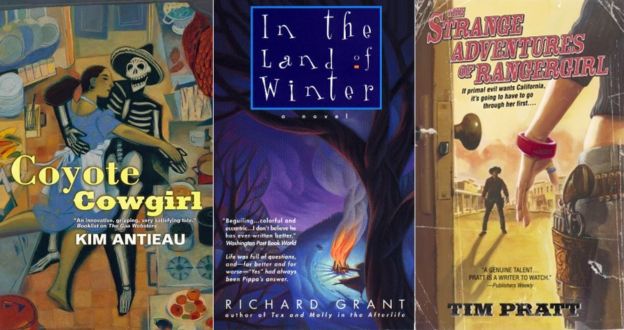I don’t read a lot of fantasy, but there are a few books I love. Kim Antieau’s Coyote Cowgirl, Tim Pratt’s debut novel The Strange Adventures of Rangergirl, and Richard Grant’s In the Land of Winter. Even though I have all three in hardcover, I have them in eBook version too, except for Grant’s, because that’s not available. Which is why I’ve read most of Kim Antieau’s work, a fair amount of Tim Pratt’s, and only one of Richard Grant’s.
Though Antiaeu and Pratt are pretty well known to fantasy readers, Richard Grant is not as well known as he should be, but I have hopes that more people will discover him. He grew up in Virginia, served in the Coast Guard, wrote a number (eight?) of fantasy and science fiction novels from the late ’80s to the end of the century and in 2006 published a historical work about coming of age in the late 1920s, and the onslaught of the Depression and the war (Another Green World). As far as I know, it’s the only title you can get on Kindle. Looking him up showed that he was Elizabeth Hand’s partner and they have two children together. I don’t know that status of that, but…small world.
As I said, I love In the Land of WInter, a story about a feisty young woman who runs afoul of her New England town because she’s a Wiccan. The three books I mentioned at the outset have several things in common. They’re all contemporary fantasies with female protagonists, whose teenage years are in the rearview mirror, marginal livelihoods (sometimes cook, barista, flower shop associate), and they’re all pretty much outcasts. In all three stories, their magic is emergent and takes them by surprise. Granted, Pippa (In the Land of Winter) is a witch, but her association with it seems more SCA than sorcery. It’s only when she’s doing the right things without intent that her connection reveals itself.
The other thing that emerges in these stories is a community of support. The characters start out alone and gradually build friendships and discover that they were never really as alone as they thought, that there was a world (how fannish of them) of people like them ready to reach out.
Thinking about it, there are other fantasies that more or less fit into this box, it any box can hold fantasy, Kij Johnson’s Fudoki, about a woman who is sometimes a cat and now has a related story, The Cat Who Walked a Thousand Miles which you can read on Tor.com. I also recommend Nathan Lowell’s Ravenwood about a woman traveling from teacher to teacher to learn the crafts of herbs and healing. Both the protagonists in these are older women, and the settings long ago, or far away, depending, but well worth the time.
